ASU professor wins 'Digging Into Data' challenge
View Source | January 23, 2014

ASU professor C. Michael Barton has been named a “Digging Into Data” challenge winner. He is among a cohort of research teams representing Canada, the Netherlands, the United Kingdom and the United States that were named by 10 international research agencies, including the National Science Foundation in the United States.
The Digging into Data program encourages research teams to develop new insights, tools and skills in innovative social science and humanities research using large-scale data analysis. Fourteen teams will receive grants to investigate how computational techniques can be applied to “big data” in social sciences and the humanities. Each team represents collaborations among scholars, scientists and information professionals from leading universities and libraries in Europe and North America.




 Thousands of chemicals serving a variety of human needs flood into sewage treatment plants once their use life has ended. Many belong to a class of chemicals known as CECs (chemicals of emerging concern), which may pose risks to both human and environmental health.
Thousands of chemicals serving a variety of human needs flood into sewage treatment plants once their use life has ended. Many belong to a class of chemicals known as CECs (chemicals of emerging concern), which may pose risks to both human and environmental health.



 The modern agriculture system that feeds most of the world’s population relies in large part on phosphorus, a chemical element that is mined from a small number of ancient seabed locations around the world. Phosphorus (in the form of the compound phosphate) is an essential ingredient in fertilizer and is critical for food systems worldwide, but about 75 percent of it is mined and exported from just one country – Morocco.
The modern agriculture system that feeds most of the world’s population relies in large part on phosphorus, a chemical element that is mined from a small number of ancient seabed locations around the world. Phosphorus (in the form of the compound phosphate) is an essential ingredient in fertilizer and is critical for food systems worldwide, but about 75 percent of it is mined and exported from just one country – Morocco.
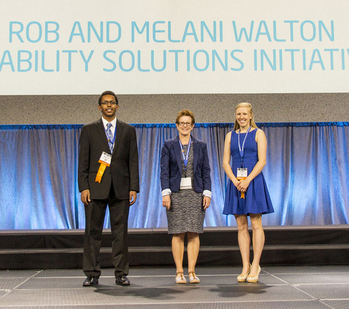 In partnership with the GreenBiz Group and The Sustainability Consortium, Arizona State University's
In partnership with the GreenBiz Group and The Sustainability Consortium, Arizona State University's 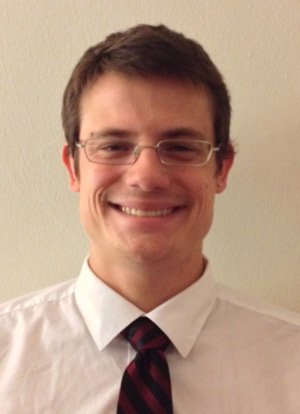 Rud Moe, a 2013 School of Sustainability graduate, is now the hospital sustainability specialist for Stericycle. Using the knowledge he gained while at ASU, Moe advises Stericycle on how they can promote less wasteful medical practices at hospitals.
Rud Moe, a 2013 School of Sustainability graduate, is now the hospital sustainability specialist for Stericycle. Using the knowledge he gained while at ASU, Moe advises Stericycle on how they can promote less wasteful medical practices at hospitals.
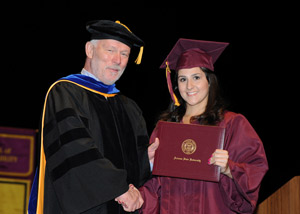 Emma Huizar-Felix, a 2012 graduate of the School of Sustainability, moved from her home state of Mexico to pursue more opportunities and a higher education. She settled in Arizona and ended up double majoring in design and sustainability and minoring in landscape architecture. From a young age, she knew hard work and determination could get her anywhere.
Emma Huizar-Felix, a 2012 graduate of the School of Sustainability, moved from her home state of Mexico to pursue more opportunities and a higher education. She settled in Arizona and ended up double majoring in design and sustainability and minoring in landscape architecture. From a young age, she knew hard work and determination could get her anywhere.



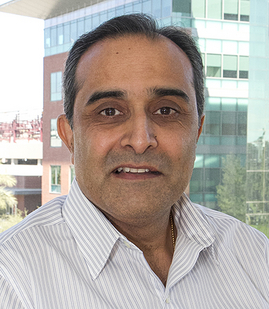 Rajesh Buch, a practice lead with Sustainability Solutions Extension Service under the
Rajesh Buch, a practice lead with Sustainability Solutions Extension Service under the 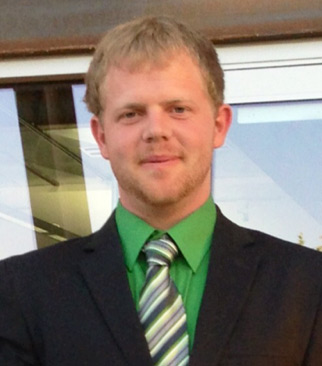 Bradley Baker graduated from the School of Sustainability in 2012. Now, he works as a hazardous waste compliance officer at the Arizona Department of Environmental Quality (ADEQ) Waste Programs Division. He learned at a young age that our resources are finite, and taking care of them takes personal and group responsibility.
Bradley Baker graduated from the School of Sustainability in 2012. Now, he works as a hazardous waste compliance officer at the Arizona Department of Environmental Quality (ADEQ) Waste Programs Division. He learned at a young age that our resources are finite, and taking care of them takes personal and group responsibility.
